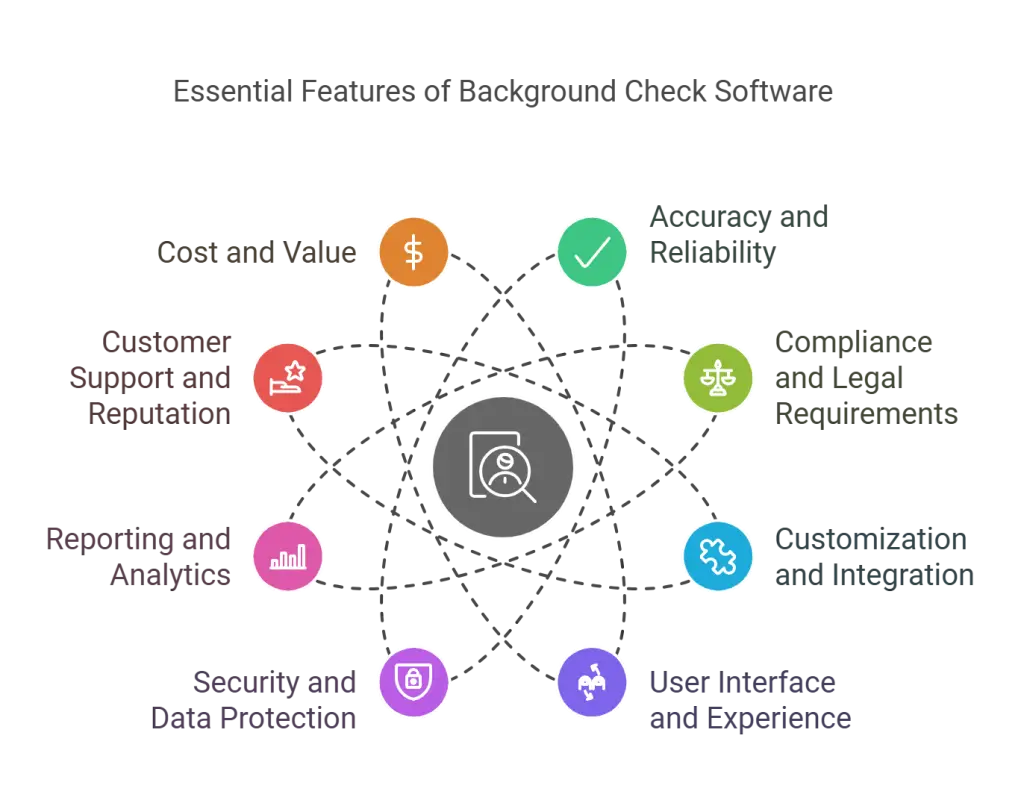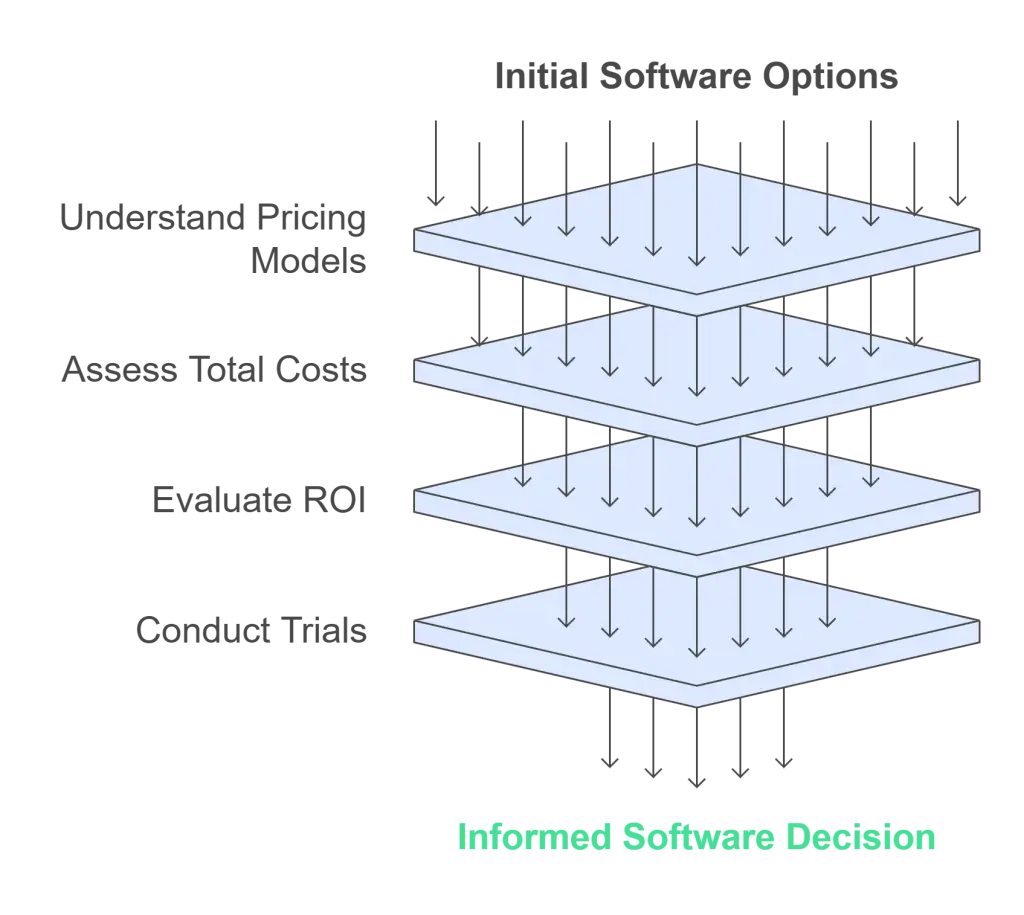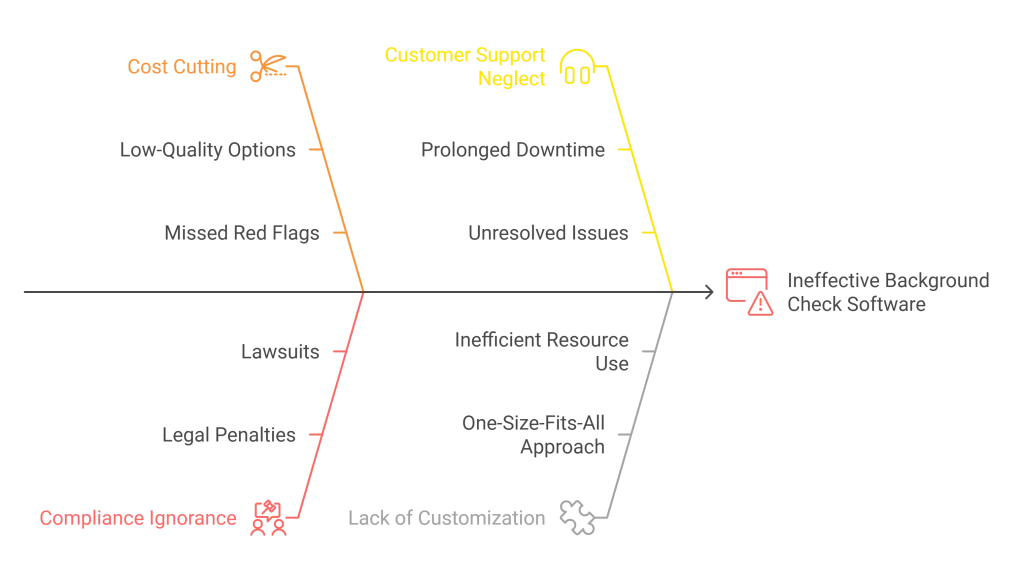Background checks have become a staple of the hiring process, ensuring that candidates are who they say they are and have the clean slate they claim to have. But with so many options, how do you choose the right background check software? This comprehensive guide breaks it down for business owners, HR professionals, recruiters, and job seekers across various industries.
Key Takeaways
- Selecting the right background check software streamlines verification processes, saving time and reducing human error.
- Key features include a user-friendly interface, comprehensive screening options, customization, integration capabilities, and strong customer support.
- When evaluating cost, consider pricing models like per-report or subscription-based and weigh them against long-term value and ROI.
- Tailor your software choice to meet industry-specific requirements, such as compliance needs in healthcare or quick turnaround times for staffing agencies.
- Avoid common pitfalls by not cutting corners on cost, ensuring compliance, valuing customer support, and opting for customizable solutions.
Introduction
In today's fast-paced hiring landscape, selecting the right background check software is more critical than ever. Businesses can't afford the risk of not verifying candidates thoroughly, whether for employment, tenant screening, or volunteer verification. That's where background check software steps in, acting as the first line of defense in shielding organizations from potential risks.
Background check software streamlines the verification process, allowing for quick and efficient reviews of criminal records, employment history, education, etc. It takes what used to be a manual, time-consuming process and automates it with precision and speed. The result? You can focus more on finding the right fit and hiring them in record speed as a result of the implementation of the software that handles the detailed work.
This guide aims to demystify the background check software market, helping you make an informed choice that perfectly suits your needs. Whether you're a business owner, HR professional, recruiter, or job seeker, understanding how to choose the best software can make a difference. Let's dive in and explore the essential features, costs, and considerations to remember.
EXPERT INSIGHT: Welcome to the age of AI, where information is at your fingertips and processes move at lightning speed. The background check industry is riding this wave to the future with advanced software solutions that make the process more efficient, faster, and highly accurate. Are you partnered with a background check provider that offers advanced and customizable software? - Emile Garcia, SHRM-SCP, CHRP, CHRBP

What Is Background Check Software?
Background check software is a digital tool organizations use to verify the backgrounds of prospective employees, tenants, and volunteers. These checks include criminal records, employment history, education verification, and identity verification.
The software automates gathering and analyzing data from various sources, saving employers time and reducing the chance of human error. It's designed to be thorough and produce accurate, reliable results that help organizations make informed decisions.
Accurate and reliable background checks are crucial because they help minimize risk. For employers, a thorough background check helps ensure you bring someone trustworthy and qualified into your organization. Tenant screenings help landlords avoid problematic renters who could cause issues down the line. For non-profits, it ensures volunteers don't pose any risks to those they aim to help. Investing in reliable background check software reduces liabilities and maintains the integrity of your community or organization.
Key Features to Look for in Background Check Software

Choosing the right background check software can be a game-changer for hiring or tenant screening processes. Here are the key features you'll want to keep an eye on:
Accuracy and Reliability
When evaluating background check software, accuracy and reliability should be paramount. Inaccurate information can lead to poor decision-making and legal ramifications. Assess software providers' methods to verify data, ensuring they utilize reputable sources and thorough verification processes.
Compliance and Legal Requirements
Background checks are subject to various legal frameworks and regulations, such as the Fair Credit Reporting Act (FCRA) in the United States. It is crucial to choose background check software that complies with these regulations and industry standards. Look for features that facilitate compliance, such as consent management tools and data protection measures.
Customization and Integration
Every business has unique requirements regarding background checks. Choose software that offers customization options to tailor the process to your needs. Additionally, integration capabilities with existing systems and software should be considered to streamline workflows and improve efficiency.
User Interface and Experience
A user-friendly interface is essential for maximizing productivity and minimizing training time. Look for software with an intuitive design and robust support documentation. Accessibility features should also be considered to accommodate users with diverse needs.
Security and Data Protection
Protecting sensitive personal information is a top priority when conducting background checks. Ensure the software employs robust security measures like encryption and secure storage protocols. Compliance with data protection regulations, such as the General Data Protection Regulation (GDPR) and the California Consumer Privacy Act (CCPA), is non-negotiable.
Reporting and Analytics
Comprehensive reporting and analytics capabilities are valuable for extracting actionable insights from background check data. Evaluate the background check software's reporting features, including customizing reports and analyzing trends and patterns.
Customer Support and Reputation
Responsive customer support is essential for resolving issues and addressing concerns promptly. Research the reputation of software providers, considering factors such as customer reviews, testimonials, and industry accolades. A reputable provider with a track record of excellence is more likely to deliver a positive experience.
Cost and Value
Finally, consider the cost of the software relative to its features and capabilities. While affordability is important, prioritize value over price alone. Evaluate pricing structures and plans, comparing the features offered at different prices to determine the best fit for your budget and requirements.
Evaluating the Cost and Value of Background Check Software

When choosing background check software, cost is not just a number—it's a value proposition. Understanding the pricing models and evaluating the return on investment (ROI) are crucial steps in making an informed decision.
Pricing Models
Background check software typically comes with a few common pricing structures:
- Per-Report Pricing: You pay for each background check report individually. This flexible model works well for small businesses or those with infrequent screening needs.
- Subscription-Based Pricing: Pay a monthly or annual fee for a set number of reports. This model suits businesses with a steady hiring pace and offers predictable costs.
- Pay-As-You-Go: Pay only for what you use, without any monthly commitments. Ideal for startups or seasonal businesses with fluctuating hiring demands.
Cost vs. Value
It's important to not just look at the price tag but also weigh the cost against the value the software brings. This includes:
- Total Cost of Ownership (TCO): Factor in all costs, including initial setup, licensing, and hidden fees.
- Long-Term ROI: Consider the savings from potentially preventing bad hires, legal issues, and turnover.
- Efficiency Gains: Calculate how much time the software saves your HR team, freeing them up for other crucial tasks.
Demo and Free Trials
Never underestimate the power of a hands-on evaluation. Taking advantage of demos and free trials can provide valuable insights:
- Assess Usability: Determine if the software is user-friendly and aligns with your team's workflow.
- Feature Testing: Check if it has all the features you need and that they perform well.
- Support Evaluation: Use this period to test customer support responsiveness and quality.
Investing the time to field test different options can prevent costly mistakes down the road. Analyze your findings holistically and balance cost with each software option's overall value.
Common Pitfalls to Avoid

Cutting Corners on Cost
While it might be tempting to go for the cheapest background check software available, doing so can backfire. Low-cost options often lack the robustness and reliability needed for thorough screenings. Subpar software may miss critical red flags, leading to hiring mistakes that could be costly in the long run. Ensure you're getting value for your money by considering not just the price but the quality and comprehensiveness of the features offered.
Ignoring Compliance
Non-compliance with legal standards can result in severe penalties. Background check software must adhere to regulations like the Fair Credit Reporting Act (FCRA) and other industry-specific guidelines. Ignoring compliance can expose your organization to lawsuits and hefty fines. Always choose software that is updated regularly to stay in line with current legal requirements and provide compliance support.
Overlooking Customer Support
Support might seem secondary until you need it. Poor customer support can lead to prolonged downtime and unresolved issues, disrupting your HR processes. Opt for software that offers robust customer support, including training resources and timely assistance, so you can resolve any hiccups promptly and keep your operations running smoothly.
Failing to Customize
No two organizations are alike, so using a one-size-fits-all approach can lead to inefficiencies. If the software doesn’t allow you to tailor screenings and reports to your specific needs, you may waste resources on unnecessary checks or miss out on crucial data. Choose a solution that offers customization options to align with your unique hiring criteria and industry demands.
Tips for a Smooth Implementation
Training and Onboarding
Rolling out new software can be a pain without proper training. Hold comprehensive training sessions to get your team up to speed. Use a mix of hands-on workshops, online tutorials, and Q&A sessions. Make it interactive—people retain more when they do tasks rather than listen. Designate a few internal champions who can become go-to experts for questions after the initial training period.
Data Migration
Moving existing records into your new system shouldn’t be an afterthought. First, audit your current data to ensure accuracy and completeness. Then, work with your software provider to map out the data migration process. Automated tools can be lifesavers, but manual verification steps are equally essential. Always keep backups and test migrations to catch any errors early. This way, your transition will be smoother and minimize downtime.
Ongoing Support
Even the best software comes with a learning curve. Solid ongoing support is key. Ensure your software provider offers robust post-implementation support options, such as 24/7 help desks, live chat, and dedicated account managers. Regular updates and training refreshers will keep your team sharp and your system running efficiently. Schedule periodic check-ins to review the software’s performance and address any new challenges or features that arise.
Focusing on these steps will minimize disruptions and maximize the benefits of your new background check software, ensuring it's a valuable asset rather than a complicated hurdle.
Industry-Specific Considerations
When selecting background check software, it's essential to consider your industry's unique needs and regulations. Different sectors prioritize different types of checks and compliance standards, so understanding these nuances can help you make a more informed choice.
Staffing Agencies
Speed and efficiency are paramount for staffing agencies. To keep your hiring pipeline moving smoothly, you'll need software that offers quick turnaround times. Look for features like bulk screening capabilities, which can handle multiple candidates simultaneously without sacrificing quality.
Healthcare
Compliance isn't just important in the healthcare sector—it's mandatory. Stringent regulations such as the Health Insurance Portability and Accountability Act (HIPAA) require extensive background checks. You'll need software that excels in verifying educational backgrounds, licenses, and employment history while ensuring FCRA compliance.
Transportation
Transportation companies must adhere to Department of Transportation (DOT) regulations, making it crucial to have software that supports DOT-specific checks. Real-time monitoring features can also be beneficial for ongoing compliance with safety standards.
Tenant Screening
Financial reliability is key for property managers and tenant screening purposes. Detailed credit checks, rental history verifications, and eviction records are essential. Choose software that offers comprehensive reports to help you make informed decisions about potential tenants.
Non-Profit
Non-profits often operate on tight budgets, requiring affordable yet thorough background checks for volunteers. Look for software that offers discounted rates for non-profit organizations while providing comprehensive criminal background checks and identity verification.
Retail
Employee fraud and theft can be significant concerns in retail. Features that help detect fraudulent behavior and prevent theft are vital. Consider software options that offer continuous monitoring for red flags and thorough pre-employment screenings.
Technology
The tech industry values identity verification and cybersecurity highly. Your chosen software should be proficient in advanced identity checks and may need to include cybersecurity assessments to safeguard sensitive company information.
Hospitality
The hospitality industry must balance customer service with safety. Background check software should include customer-facing safety checks, such as criminal history and sex offender registries, to ensure the safety of both guests and staff.
By recognizing and addressing your industry's specific needs, you'll be better equipped to choose the background check software that offers the most value and reliability.
Conclusion
Choosing the right background check software is more than just ticking off features on a checklist. It’s a critical step that can significantly impact your hiring and screening processes. Let’s recap the main points:
Ensure the software offers a user-friendly interface, comprehensive screening options, customization and flexibility, seamless integration capabilities, and robust customer support. Don't overlook the importance of compliance with legal standards.
Evaluate the cost models—per-report, subscription-based, or pay-as-you-go—and weigh them against the value provided. Remember to consider the total cost of ownership and take advantage of demos and free trials to understand each software fully.
Different industries have unique requirements. Whether you need to meet stringent compliance in healthcare, quick turnarounds for staffing agencies, or comprehensive checks for the hospitality sector, tailor your choice to your specific needs.
Utilize resources like Gartner, Capterra, and G2 for detailed comparisons and reviews of leading background check software solutions. This will give you insights into user experiences and performance.
Don’t cut corners on cost, neglect compliance, overlook the importance of customer support, or settle for non-customizable options. These can lead to bigger issues later.
By carefully evaluating your options, you ensure a smoother, more efficient, and compliant screening process that benefits your organization in the long run. Begin your journey today with the resources and guidelines provided, and choose the background check software that best meets your needs. Happy selecting!
About GCheck
GCheck’s services empower businesses to build better teams by ensuring accurate, timely, and compliant background checks. Our commitment to innovation, customization, and compliance sets us apart as a trusted partner in talent acquisition.
- Criminal Background Checks: Ensure workplace safety by checking candidates' criminal history at all levels. Fast and compliant.
- Employment Verification: Quickly confirm job history to ensure candidates are honest and reliable.
- Education Verification: Verify degrees and certifications to ensure candidates’ qualifications are genuine.
- Drug Testing: Promote a safe, drug-free workplace with customizable testing options.
- MVR Driving Record Checks: Check driving records to ensure safety and compliance for driver roles.
- People Searches: Access accurate, nationwide data for complete candidate vetting.
Still have questions?
Get in touch with our team today for a personalized demo and discover how our tailored volume pricing and packages can drive results for your business!
How useful was this page?*
Note: your comments are anonymous. We use them to improve the website. Do not include any personal details.
Visit our FCRA Compliance Tool or leave a message here if you need a response.
From the blog Explore the GCheck Content Hub

Fingerprint Background Checks: 2026 Guide for Regulated Industries
7 Jan, 2026 • 18 min read
Employee Social Media Screening: A Complete Guide for HR Professionals in 2026
6 Jan, 2026 • 21 min read
AI Background Checks: How Automation Is Reshaping Employment Screening in 2026
30 Dec, 2025 • 24 min readThe information provided in this article is for general informational and educational purposes only and should not be construed as legal advice or a substitute for consultation with qualified legal counsel. While we strive to ensure accuracy, employment screening laws and regulations—including but not limited to the Fair Credit Reporting Act (FCRA), Equal Employment Opportunity Commission (EEOC) guidelines, state and local ban-the-box laws, industry-specific requirements, and other applicable federal, state, and local statutes—are subject to frequent changes, varying interpretations, and jurisdiction-specific applications that may affect their implementation in your organization. Employers and screening decision-makers are solely responsible for ensuring their background check policies, procedures, and practices comply with all applicable laws and regulations relevant to their specific industry, location, and circumstances. We strongly recommend consulting with qualified employment law attorneys and compliance professionals before making hiring, tenant screening, or other decisions based on background check information.

